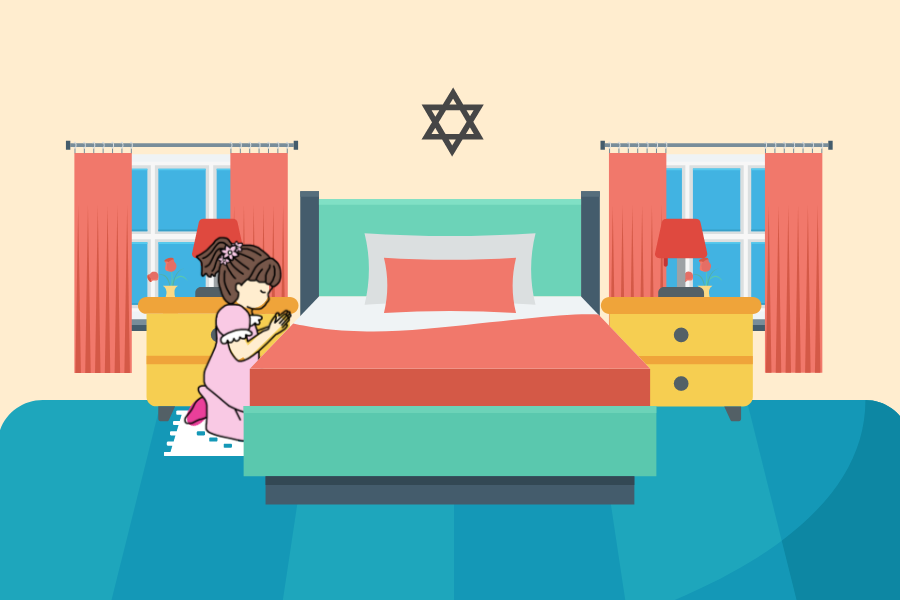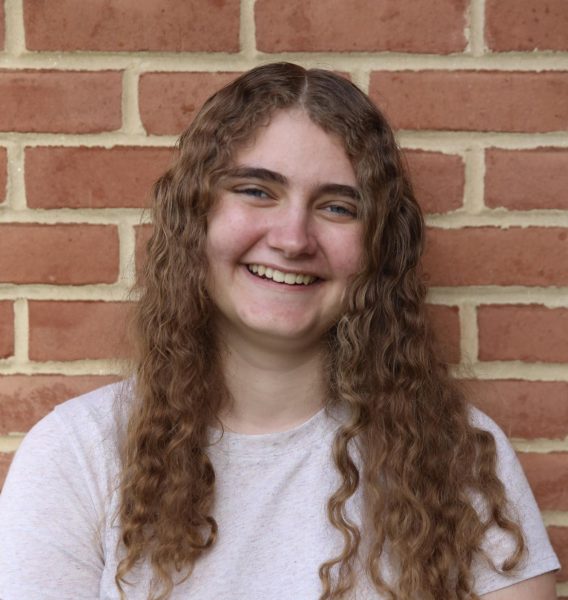Learning to follow Judaism out of love, not fear
Throughout middle school, I constantly worried about the morality behind my actions and how God would feel about them. Anxiety was the sole basis of my religion; I didn’t pray because I wanted to but out of fear.
May 29, 2023
At 11 years old, I sat at my synagogue’s annual Rosh Hashanah service, my eyes floating through the room, focused on anything but the bema. My feet swung impatiently beneath me as my fingers traced the hardwood edge of my seat. I tried to pay attention, but all I wanted to do was read a book.
My family isn’t particularly religious, so my disinterest in Judaism wasn’t atypical for my household, nor was it surprising to my rabbi. My family and I have always attended the high holiday services, Rosh Hashanah and Yom Kippur, but that was the extent of our religious involvement.
Every few moments throughout the service, my thoughts would momentarily shift away from my surroundings and back to the rabbi’s words. As he explained the importance of the holiday, I forced myself to listen.
“On Rosh Hashanah, their decree is inscribed, and on Yom Kippur it is sealed,” the rabbi said. “How many will pass away and how many will be created, who will live and who will die; who will come to his timely end, and who to an untimely end; who will perish by fire and who by water.”
The words sent a shockwave through my spine and forced me to sit upright again. My mind began to race. Would I be killed by a fire if I was a little too judgmental in the following days? Would I perish by water if I gossiped a bit too much?
Eventually, the rabbi finished the prayer, but the words rang in my ears. Paralyzed with an overwhelming fear unlike anything I’d felt before, every action felt desperately important when my fate was to be decided in the following days. The idea consumed my mind like a parasite, unwilling to let me think freely.
This service was the catalyst for my long-term struggles with suffocating religious anxiety, which I’ve only recently been able to overcome. Throughout middle school, I constantly worried about the morality behind my actions and how God would feel about them. Anxiety was the sole basis of my religion; I didn’t pray because I wanted to but out of fear.
The constant worry about God was unlike any social anxiety I had experienced in the past because it saw no bounds. There was no escape from God’s eyes, so there was no escape from my constant quest to act perfectly.
Once the pandemic hit, my mental wellbeing began to deteriorate. I was hopelessly consumed by worries that were outside of my control. Every single thought nagged at the edge of my brain until I decided I needed to relieve myself of some of them. The pandemic anxiety had no cure, and loneliness couldn’t be solved without governmental action. The only stressor within my control was my faith. So I decided to stop believing in God to quiet my racing mind.
In 2021, for the first time in my life, I skipped Rosh Hashanah services. I knew that listening to those prayers would only catapult me back into desperation. That wasn’t something I could handle.
The nearing end of the pandemic marked the revival of my religious anxiety. As the stressors of Covid-19 lessened, there was a space for religious worries to fill.
I sat at another Rosh Hashanah service, unsure of my identity and how to be Jewish without letting it control my life. After that service, I emailed my rabbi asking to join his 10th-grade confirmation class. I figured reaching out to him could be what I needed to rebuild my faith into something stronger and healthier.
As it turns out, this discussion-based class was centered on helping students confirm their religious identity and culminated in a confirmation service where we declared our identities to the congregation.
A month into the class, we began to discuss our relationships with God. I recoiled at the mention of a higher power, wary of falling into the trap that once consumed me. I wanted to ensure I could believe in God without the belief that any wrong move would lead to eternal damnation.
The rabbi began to explain the three unknown elements of God: omniscience (all-knowing), omnipotence (all-powerful) and omnibenevolence (all-good). Each of these factors, he explained, contributes to how one interacts with God, but any combination of them is valid under Judaism.
This discussion struck a chord in me — I had never allowed myself to genuinely consider what I believed about God. I had assumed I believed in a traditional version of a higher power. I used this opportunity to make the affirmative decision that I did believe in God, but also that I didn’t believe in an omniscient one. I didn’t believe in a God that was aware of my every action in every moment. Without the fear that a higher power was observing me at every moment, I could follow my morals because I wanted to rather than because I felt forced to.
This revitalized view of God was a crucial step toward healing my spirituality, and it allowed me to take control of my religion. Instead of being the catalyst for renewed struggle, going to Rosh Hashanah services after Covid started healing my broken faith.
I won’t pretend that my faith in God is perfect. I still worry about those 10 days between Rosh Hashanah and Yom Kippur, and every so often, I still think that I have chosen to believe in the wrong profile of God.
But now, my faith is no longer based on guilt. Rather, it’s based on a genuine belief in a higher power. This year I will again attend Rosh Hashanah services, but this time purely out of love, not fear.
I am happy to say that I am Jewish, not because I have to be, but because I want to be.











Jay S • Nov 11, 2023 at 8:08 pm
Thanks for this piece, Rebecca. Very well written and impressive that you took the initiative to reach out for help (your Rabbi).
Anonymous • May 31, 2023 at 5:02 pm
This is incredibly well-written. It probes readers to question their own relationships with religion in a sensitive but meaningful way that not many people can express. Congrats on a great piece!!!